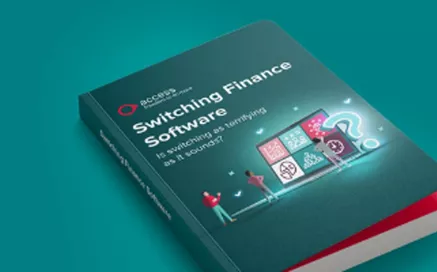
What is the best university accounting software in 2024?
When you’re considering investing some of your precious funds into new university accounting software, it obviously pays to do your research first. Universities are under more pressure than ever before when it comes to their finances, so it’s crucial to have a robust finance system in place - not only to help your Finance team do their jobs properly, but also to ensure every pound received and spent is managed and tracked and its impact maximised. All of which means it’s vital to have the best accounting software for universities in place at your institution.
 7 minutes
7 minutes
Written by The Access Group
What is university accounting software?
Like every business, academic institutions and universities must manage their finances carefully and take all steps needed to meet the relevant legal requirements in place at every step.
Accounting software for universities is designed to make all of the many processes involved in money management easier, more efficient and more robust. A modern software finance package brings everything together and means it’s possible to manage end-to-end finances from cash into strategic reporting – all via one solution.
And financial software has come a long way over the last few years: for example, it has evolved to include advances in core areas such as data management, automation and Artificial Intelligence.
Updating your university accounting software to something more current can bring significant benefits to your Finance team and to your university.
What is the best accounting software for universities from the UK in 2024?
Why not look into the topline key features of the best accounting software for universities currently available? Bear in mind however that although generic accounting software can also be considered, it is not likely to offer specific functionality for the higher education sector.
Below is a quick overview of the most popular accounting software solutions being used by universities and higher education institutions across the UK today.
Access Financials
Automation, flexibility and visibility of educational finance management, and key operational processes are all built into the Access Financials solutions for universities, higher education as well as schools and academies. This cloud-based package is a comprehensive range of functionality and tools that are already meeting the needs of universities across the UK. Key features include:
- Centralised dashboard for your financial information
- Automated procurement and purchasing processes
- Real-time, customisable reports and built-in templates
- Advanced search and filter options
- Integration with other Access products and third-party apps
QuickBooks
The QuickBooks accounting software package aimed at educational stakeholders is marketed as a user-friendly solution for schools, as well as higher education institutions. It enables them to automate crucial tasks, monitor income and expenses, and efficiently oversee other financial aspects such as income from tuition, grants, suppliers or services. It also includes some automated features and offers an overview of cashflow. A mobile accounting app is also available.
Sage for Education
While Sage is a good option, this is primarily aimed at schools and academy trusts. It may be a useful resource for some universities or higher education institutions. Sage comes with several off-the-shelf features for a broader range of customers such as customisable reports, cloud-based technology, filters, a quick search option, and a monthly subscription.
Benefits of accounting software for universities
• Keep track and oversee tuition and student fees with robust data management tools. Debates about tuition fees (and what universities do with them) continue to rage on – both internally and in the media. It’s therefore prudent to have detailed and accurate data on hand to stay ahead of the discussion, show how you make the most of the cash, and always have the best information to hand.
• Comprehensive management of grant funding and financial aids. Funding is the lifeblood of every university and having a robust system in place to manage these inputs makes applying for money easier and helps to ensure your institution makes the most of every penny. Auditing becomes so much easier too.
• Easily monitor and record staff and volunteer expenses. Expenses can be one of the most time-consuming and error strewn elements of financial management, particularly if paper forms, receipts and manually inputting are part of your process. Up-to-date financial software brings scanning, automation and online approvals into the mix, making everyone’s life easier and improving accuracy and speed of expense processing.
• Generate a range of financial reports quickly and easily, either using templates relevant to your university’s needs, or by creating customised reports using in-built reporting tools. No more time-consuming sourcing of data from multiple sources, or trying to constantly update complex spreadsheets.
• Ease of compliance with DfE, ESFA, CFR, SOFA obligations. Producing the right information, in the right format, and submitting on time, can all understandably be a headache if too much manual intervention or updating is required. Accounting software for universities can ease the burden, not least because the functionality is built with these submissions in mind.
• Reap the benefits of a cloud-based solution including vastly enhanced security of your university financial data, automatic software updates and improvements, plus options for finance staff to work remotely if required.
Key questions to consider when selecting the best university accounting software
So how do you decide what’s ‘best’ when it comes to technology?
Clearly, the range of key features and functionality included will need to be the right fit – and pricing will obviously be an important factor in your decision-making process – but there are other vital elements to bear in mind too.
Is your university growing (or likely to) over the coming years?
If so, one key consideration is scalability. Make sure to choose a software solution (and provider) that can flex and grow with your changing needs.
How easy will it be to change from your current system to a new solution?
It’s important to take time to talk to potential solution providers about their migration and implementation processes. The support levels will definitely vary and some will be easier to manage than others.
What pricing options are available?
If you want to get the best fit price-wise and potentially include some integrations with your existing set-up, then you’ll be unlikely to get value for money from providers with a one-size-fits-all approach to pricing. It’s therefore worth digger deeper into exactly what is included (and what isn’t of course).
What level of ongoing support will you need?
Some universities have limited internal IT support; others have an IT team that is already fully stretched to the limit with no additional capacity. Take time to check with each provider you are considering what their level of customer service is. If you’re likely to need to call on them, you’ll want nothing less than the best in class.
Is the software provider investing in long-term product development?
Lastly, ask yourself what is the software provider doing to keep their products up-to-date and in line with the changing needs of the university accounting software market.
It may not make a difference immediately, but over time, you will feel more confident with a provider that is investing in the ongoing development of their products and keeping pace with change.
The bottom line
Ready to take the next step? If you need to progress on your journey towards finding better, more suitable university accounting software, why not talk to one of our experts at Access? We already support many universities, higher education institutions, academies and schools and we understand exactly what you’re looking for.
See how our accounting software for Higher Education can work for your institution
More accounting software resources

A review of off-the-shelf accounting software 2024
Off-the-shelf or bespoke accounting software? We review the advantages and disadvantages of off-the-shelf accounting software to help you decide which is the best for your business.

How to choose your new finance system
What steps should you take to choose your new finance system? Our free guide explains each step from setting the scope to purchasing your finance system.

The everything guide to switching finance software
That’s what this guide is all about, giving you an insight into best practice and some of the things you may or may not have thought about.

How long does it take to implement new finance software?

Your go-to year-end accounts checklist: 10 steps you need to follow
A simple 10-step checklist for year-end accounts. 1 - Process employee bonuses. 2 - Safeguard cash balances. 3 - Employee expenses. View full checklist.

Advantages and disadvantages of accounting software
This article explains the advantages and disadvantages of accounting software as well the pros and cons of Access Financials, Sage and Xero. Read now.
